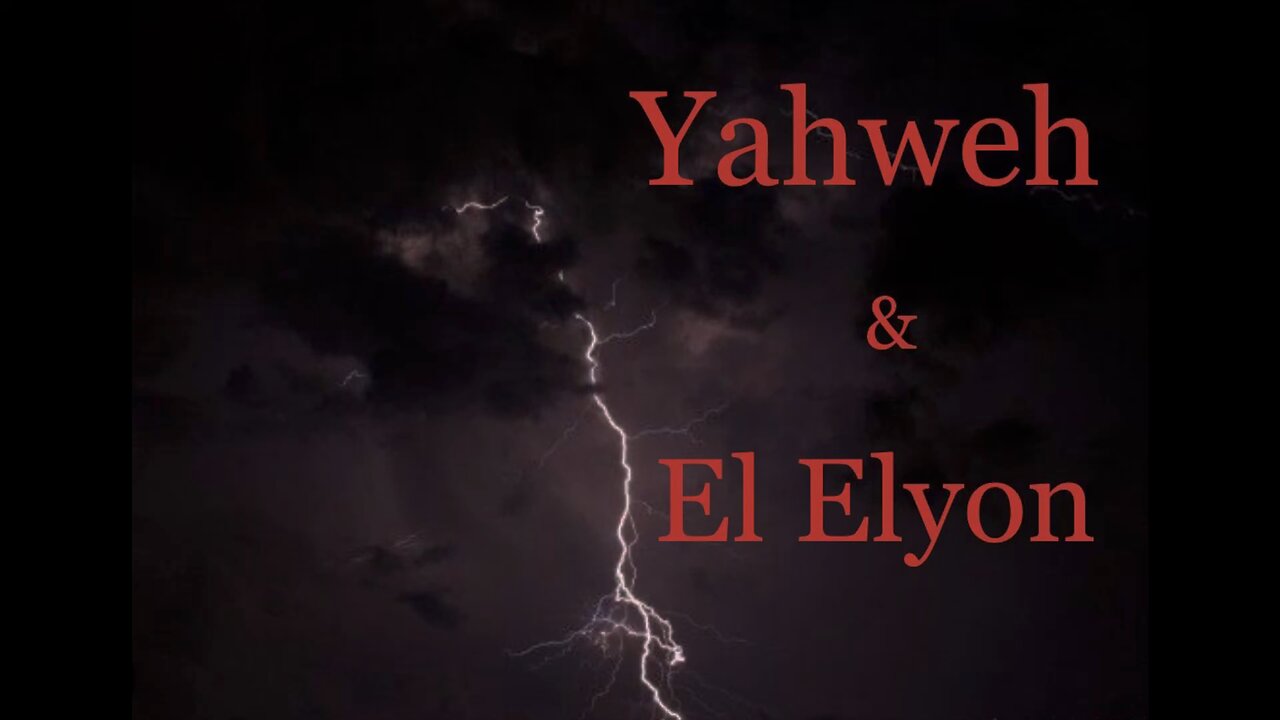Premium Only Content

Yahweh & El Elyon
#Yahweh #Elyon #DivineCouncil
It seems to be the majority view among scholars that pre exilic Israel shared the polytheistic worldview of her pagan neighbors. In this view, Yahweh was a member of the pantheon (one of the sons of Elyon) and became Israel’s National god (Deuteronomy 32:8-9). Over time Yahweh subsumed the characteristics of the gods of Canaan and emerged as the head of the pantheon (Psalm 82). Israel slowly evolved into monotheism and their scriptures were then redacted and all traces of the previous polytheism were removed. Michael Heiser “This evolution, according to the consensus view, was achieved through the zealous commitment of Israelite scribes who edited and reworked the Hebrew Bible to reflect emerging monotheism and to compel the laity to embrace the idea.” Except these same scholars who promote this consensus opinion also state that all traces of the previous polytheism weren’t fully redacted and that’s why we have Deuteronomy 32 and Psalm 82.
Deuteronomy 32:8-9, as I mentioned, is cited in support of this evolutionary view by assuming that Yahweh and Elyon are separate deities. Heiser “this consensus view lacks coherence on several points.”
In this study we will go through the scholarship, and there has been a lot written on this subject. I will be quoting many scholars, even scholars who believe in the consensus view, to show that, in fact, Yahweh and El Elyon are one and the same.
Deuteronomy 32:8-9 When the Most High (Elyon) gave to the nations their inheritance, when he divided mankind, he fixed the borders of the peoples according to the number of the sons of God. But the LORD’s portion is his people, Jacob his allotted heritage.
Mark S Smith in his book “God in Translation”, says, “Despite possible appearances to the contrary…the composer did not intend any picture of polytheism with his rendering of verses 8-9. In fact, he likely thought of El and Elyon simply as two of Yahweh’s titles (as they are elsewhere in the Bible) and not as a separate god, El.”
As Heiser says, “In Deuteronomy 4:19-20, a passage recognized by all who comment on these issues as an explicit parallel to 32:8-9, the text informs us that it was Yahweh who allotted the nations to the host of heaven and who took Israel as his own inheritance. Neither the verb forms nor the ideas are passive. Israel was not given to Yahweh by El, which is the picture that scholars who separate El and Yahweh in Deuteronomy 32 want to fashion. In view of the close relationship of Deuteronomy 32:8-9 to Deuteronomy 4:19-20, it is more consistent to have Yahweh taking Israel for his own terrestrial allotment by sovereign act as Lord of the council.”
Mark S Smith “In short, 4:19 presupposes the identification of El Elyon as the god of Israel in 32:8.”
Smith “In sum, these echoes of Deuteronomy 32:8-9 [4:19, 29:25] in the book of Deuteronomy show a monotheistic reading that identifies Yahweh as El Elyon.”
Smith “What we perhaps have in Deuteronomy 32:8-9 is a notion of minor divinities, who serve the absolute divine King; these are, relatively speaking, so powerless compared to Yahweh that for the composer, they do not truly constitute gods like Yahweh. They are perhaps the ‘elim of the Qumran Songs of the Sabbath Sacrifice, minor “divinities”, actually angels, but hardly gods in the modern, conventional sense.”
Smith “Deuteronomy 32, in telling the story of Israel’s relationship with its God, begins with a single divine head, Yahweh El Elyon.”
Dictionary of Deities and Demons in the Bible, in their entry on Elyon, says, “In the present form of the biblical text, the term [Elyon] is understood to be an epithet for Yahweh, the God of Israel.”
Theodore J Lewis, in his book “The Origin and Character of God”, says, “the application of the title Elyon to Yahweh was ubiquitous.”
As you can see from both the Bible and the scholarship, Yahweh is El Elyon!
Select sources
Alter, Robert. The Five Books of Moses : a Translation with Commentary. New York :W.W. Norton & Co., 2004.
Elnes, E. E., Miller, P. D. “Elyon.” In Dictionary of Deities and Demons in the Bible. van der Toorn, Karel, Bob Becking, and Pieter W. van der Horst eds. Brill, 1995. Second edition, 1998.
Heiser, Michael, "Are Yahweh and El Distinct Deities in Deut. 32:8-9 and Psalm 82?" (2006). LBTS Faculty Publications and Presentations. 278.
https://digitalcommons.liberty.edu/lts_fac_pubs/278
Lewis, Theodore J. The Origin and Character of God: Ancient Israelite Religion through the Lens of Divinity. Oxford, 2020
Seow, C.L. Myth, Drama, and the Politics of David's Dance. HSM 46; Atlanta 1989
Smith, Mark S. God in Translation. Deities in Cross-Cultural Discourse in the Biblical World. Eerdmans, 2010
Westermann, C. Genesis. 3 vols. Augsburg, 1984-86.
Please like, share, and subscribe to help the channel grow! Thank you and God bless!
-
 51:57
51:57
The Rubin Report
2 hours agoAndrew Schulz Is Shocked When Dem Mayor Says What No Democrat Will Admit
24.5K19 -
 UPCOMING
UPCOMING
The Big Mig™
43 minutes agoGlobal Finance Forum From Bullion To Borders We Cover It All
91 -
 LIVE
LIVE
Rebel News
17 minutes agoCarney's strawberry servants, Chaos at McGill, Residential school censorship | Rebel Roundup
159 watching -
 LIVE
LIVE
LFA TV
15 hours agoLFA TV - ALL DAY LIVE STREAM 4/4/25
4,170 watching -
 LIVE
LIVE
Flyover Conservatives
11 hours ago6 Life-Changing Habits for Better Health & Wealth - Dr. Troy Spurrill and Clay Clark | FOC Show
352 watching -
 LIVE
LIVE
The Tom Renz Show
1 hour agoThe Tariffs Are Coming!
206 watching -
 LIVE
LIVE
Film Threat
16 hours agoMINE CRAP?!!! + LOADS OF REVIEWS!!! | Film Threat Livecast
144 watching -
 LIVE
LIVE
The Shannon Joy Show
3 hours ago🔥🔥LIVE Exclusive With Dr. Mary Talley Bowden On Tucker Carlson Interview - ‘COVID Was The Most Evil Thing To Ever Have Happened To This Nation’ 🔥🔥
289 watching -
 1:01:10
1:01:10
VINCE
4 hours agoFirst Signs That Trump's Tariffs Are Paying Off | Episode 15 - 04/04/25
210K186 -
 1:09:14
1:09:14
BonginoReport
7 hours agoMoral Relativism, Tesla Terrorists & the Left: Jack Posobiec and Evita Unveil the Truth (Ep.175)
146K68